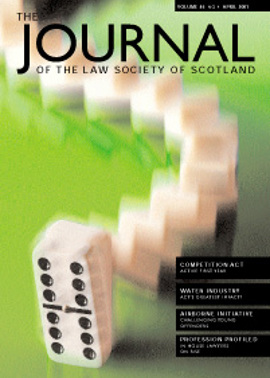Empowering offenders to change
Airborne offers a nine week residential programme for young offenders, aged 18 to 25, with a history of persistent offending, for whom other disposals have not worked.
While outdoor activities are integral to the course, the crux of the Initiative is a life skills programme where offenders are encouraged to confront and consider the consequences of their behaviour. Trainees are also engaged in job search skills, recognising that a key factor in steering them from repeat offending is having employment prospects.
General Manager Tony Burley is clear about the role of solicitors in helping make Airborne work. “Lawyers who are seeing repeat offenders, but in whom they can detect a commitment to change, might consider the possibility of raising Airborne as an option with the client’s social worker or the sentencing sheriff.
“It’s not a get out of jail free card, but a case of identifying people who maybe due to a change of circumstances are showing signs of maturity.”
Organisation Chairman Dr Alan Rutherford OBE echoes that view. “Criminal solicitors can help by identifying candidates who would benefit from attending Airborne rather than going to jail. It’s not a soft option, and the drop-out rate indicates that many candidates can’t handle the challenge.
“Solicitors in partnership with sheriffs and social workers can identify candidates who are capable, ready to change, but need help.”
Airborne, so called because it was originally set up by ex-Airborne Forces, although not along the lines of a boot camp, has since evolved to develop a more sophisticated understanding of recidivism. Starting from a process of community building, the group, a maximum of 24 at any one time, moves through team building, problem solving and eventually through to empowerment and preparing for a new start.
The climax is a graduation ceremony at which those who have successfully completed the course make a slide presentation on what they have learned to an assembled throng of family, staff and invited guests. If speaking in front of an audience can be daunting for anyone, then for a group where lack of self esteem is deemed one of their critical life failings it’s moving evidence of progress made that nearly all are able to offer composed, and in some instances, articulate, accounts of their nine week course.
“Airborne is a real alternative to imprisonment. These lads need to be removed from their communities and away from their peers. Importantly the community needs respite from them also”, said Tony Burley.
“Every aspect of the course has its own aims and objectives. We constantly evaluate the course. It’s a caring approach, but in many ways it’s harder than jail, because here they are forced to account for their behaviour all the time.
“From the time they come here we challenge offensive behaviour like swearing, spitting and dropping litter in order to challenge offending behaviour. In essence, we ask them to find a conscience, stretching their comfort zones all the time.”
Outdoor activities such as abseiling, rock climbing and the use of ropes are designed to form part of a programme to correct cognitive behaviour, helping trainees learn how to solve problems, become empowered and take charge and responsibility for their lives.
“The outdoors has proved a strong medium which produces accelerated learning and transference of skills.”
Training for the work environment includes undertaking certificated courses in First Aid, elementary health and safety, communication skills in the workplace, an introduction to PCs and proper disclosure under the Rehabilitation of Offenders Act.
A four day community project in partnership with South and North Lanarkshire Countryside services offers them a chance to give something back to the community and indeed on the most recent course, participants were praised for braving freezing temperatures at midnight to assist stranded motorists on the M74 during the worst of the winter snow..
The final stages of the course include a requirement on each individual to engage in a five day unaccompanied journey across remote hills and moorland, and “solo”, whereby they spend 24 hours in complete isolation, to consider their past lives, review what they have learnt and contemplate their futures.
Beyond the nine-week course, Airborne has an Association of Prisoners and Ex-offenders worker to help assist in the process of transition back to the communities and currently has an experienced prison officer, Steve Leslie from Polmont, on secondment.
“We don’t claim to offer a quick fix service and support is vital for when the trainees leave here, both from APEX and their own families”, said Tony Burley.
Critical to trainees succeeding is to be free of substance abuse. The Centre has a strict policy that it cannot admit candidates with drug or alcohol dependencies.
“Airborne is about empowering the people who come here. Many will have had a bad upbringing and come from disadvantaged backgrounds, but we tell them if they take responsibility they can change what happens in front of them.”






